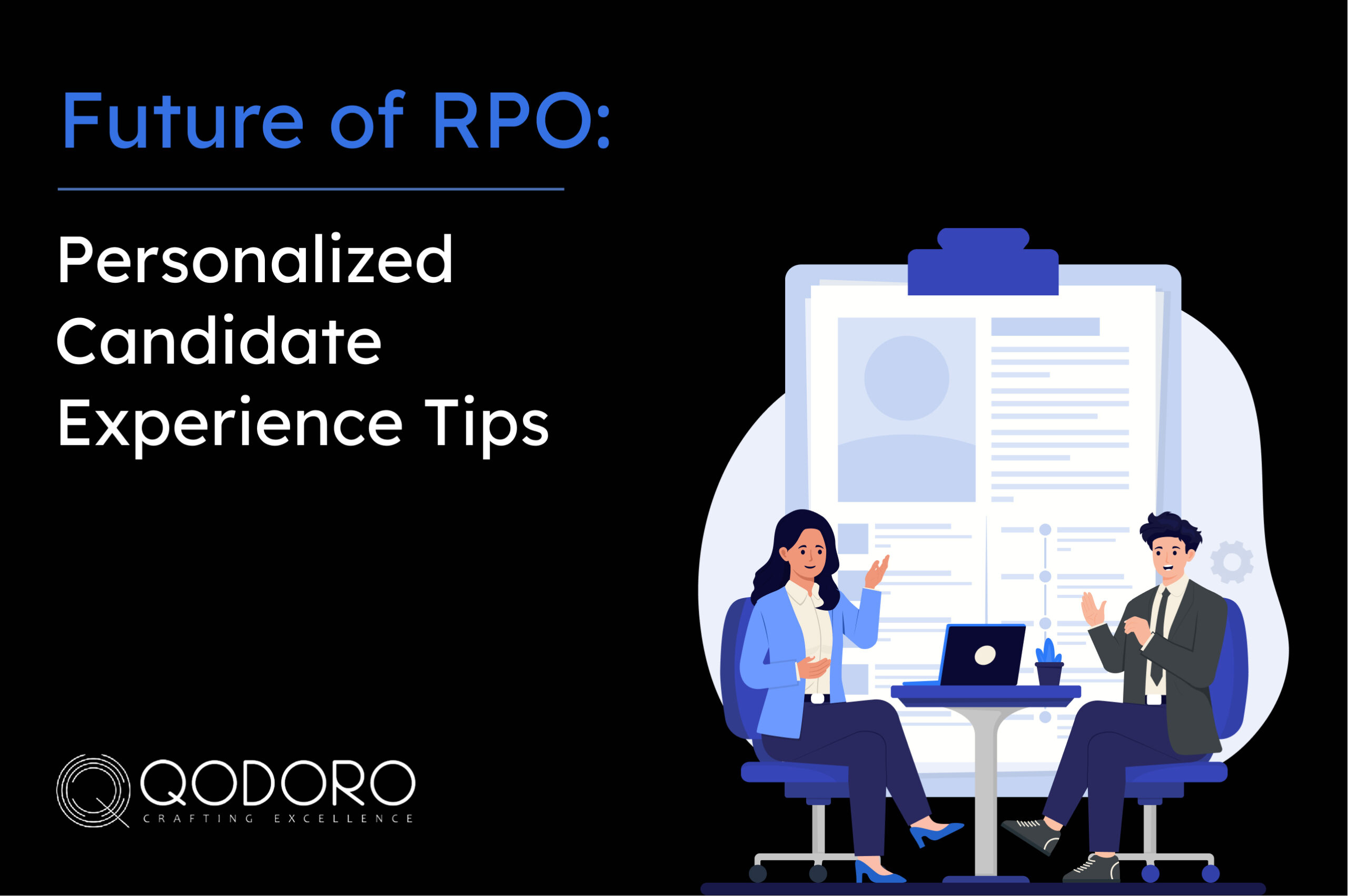
Published on: 29/08/2025

SHARE
The recruitment world is changing faster than ever. Candidates are more selective, and their expectations are higher. This means the old way of hiring just filling open positions is no longer enough. Today, talent acquisition is about creating a personalized candidate experience that keeps people engaged, builds loyalty, and strengthens your employer brand.
Looking ahead to 2025, the future of recruitment process outsourcing (RPO) is being shaped by hyper-personalization, behavioral analytics, and smart engagement strategies. Companies that don’t adapt risk losing top talent to competitors who understand that every candidate’s journey counts.
This blog will break down the trends transforming RPO, explain how behavioral analytics helps map the candidate journey, highlight effective engagement strategies, and show how experience metrics are changing hiring for the better. We’ll also explain why Qodoro is the ideal partner for companies looking to deliver a truly personalized candidate experience at scale.
Recruitment Process Outsourcing (RPO) has long been viewed as a cost-effective way for companies to delegate hiring tasks to external partners. But by 2025, RPO is no longer just about handling transactional tasks. It has become a strategic function that helps organizations enhance talent acquisition, improve candidate engagement, and strengthen their employer brand.
Today, candidates expect more than generic interactions. They want experiences tailored to their skills, interests, and career goals. They want to feel recognized and valued, not just another name in a database. This shift is being driven by technology. Tools like Artificial Intelligence (AI), machine learning, and predictive analytics are transforming how RPO providers manage talent. These technologies make it possible to automate repetitive tasks while still maintaining a human touch, identify the best-fit candidates faster through predictive matching, and craft communications that feel personal and relevant based on a candidate’s past interactions and preferences.
For organizations, this means moving away from a one-size-fits-all approach and embracing a candidate-centric model. Companies that invest in hyper-personalization are better positioned to attract top talent, engage them meaningfully, and improve retention, giving them a clear advantage in an increasingly competitive hiring landscape.
At the core of hyper-personalization is a deep understanding of the candidate journey. Every interaction a candidate has with your organization from discovering a job opening to completing onboarding shapes their perception of your brand. To create meaningful, tailored experiences, RPO providers are increasingly relying on behavioral analytics.
Behavioral analytics involves collecting and analyzing data about how candidates interact with your recruitment process. This can include the types of jobs they search for, how they respond to emails or messages, how they behave during applications, and even their engagement on social media or company platforms. By identifying patterns and trends in this data, organizations can anticipate candidate needs, remove friction points, and create a recruitment experience that feels personal and engaging.
Mapping the candidate journey through behavioral analytics typically involves three key stages:
Before candidates apply, they are exploring opportunities and learning about potential employers. Behavioral analytics helps RPO providers understand which job postings and content are most appealing to specific candidates. AI-powered recommendation engines can suggest roles that align with their skills, experience, and career aspirations. In addition, personalized content such as company insights, role previews, or employee testimonials can engage candidates early, making them feel seen and valued even before they submit an application.
AI algorithms analyze years of historical claims data, identifying patterns that commonly lead to denials. By comparing new claims against these patterns, the system can predict which claims have a high likelihood of being rejected and flag them for manual review. This means potential issues from incomplete documentation to mismatched codes can be fixed before the claim ever reaches the payer, boosting first-pass acceptance rates and keeping the revenue cycle flowing smoothly.
Engagement doesn’t stop once a candidate submits their application. Timely updates, feedback, and transparent communication are essential to maintain trust. Behavioral analytics helps recruiters understand how candidates respond to communication, how quickly they interact with follow-ups, and what kind of updates keep them engaged. By leveraging this data, RPO providers can personalize outreach, provide relevant feedback, and ensure each candidate feels informed and valued throughout the selection process.
In short, behavioral analytics turns raw data into actionable insights, helping RPO providers deliver a truly personalized candidate experience. By understanding the candidate’s behavior at every stage, organizations can anticipate needs, reduce drop-offs, and create a journey that is engaging, efficient, and tailored to each individual.
Creating a hyper-personalized candidate experience requires more than just understanding the journey, it demands active engagement at every stage. Modern RPO providers are adopting innovative strategies to connect with candidates, make them feel valued, and keep them invested throughout the recruitment process.
One key approach is using AI-driven chatbots and personalized communication. Chatbots provide instant responses to candidate queries, guiding them through each step of the hiring process. Beyond chatbots, personalized emails, SMS alerts, and in-app notifications can be tailored based on a candidate’s behavior and preferences. This ensures that every interaction is relevant, timely, and engaging, which helps maintain momentum and reduces the likelihood of candidates dropping out.
Another powerful strategy is content customization. Sharing role-specific blogs, video messages from hiring managers, or success stories from current employees helps candidates understand the company culture and what the role entails. Personalized content makes candidates feel informed and valued while positioning the employer as attentive, transparent, and genuinely invested in their success.
Gamification and immersive experiences are also transforming candidate engagement. Interactive quizzes, gamified assessments, and virtual reality (VR) experiences make the recruitment process more enjoyable and memorable. When candidates find the process fun and engaging, they are more likely to remain committed and form a positive impression of the organization.
Finally, candidate-centric feedback loops are crucial for maintaining engagement. Collecting feedback at each stage allows recruiters to adjust strategies in real-time, ensuring that candidate needs are being met. When candidates feel heard and see that their input leads to improvements, satisfaction increases, and the employer’s reputation is strengthened.
By combining these strategies with behavioral analytics, RPO providers can deliver a highly personalized and meaningful experience. The result is not just higher conversion rates and stronger talent pipelines, but also a positive candidate journey that supports long-term recruitment success and reinforces the employer brand.
A hyper-personalized recruitment strategy is only effective when paired with strong experience metrics. These metrics help organizations understand how well their RPO efforts are performing and highlight areas where improvements are needed.
Key metrics include candidate satisfaction scores (CSAT), which measure how satisfied candidates are with their recruitment experience. High CSAT scores indicate that the process is engaging, smooth, and personalized. Another important metric is the Net Promoter Score (NPS), which shows how likely candidates are to recommend the company to others. A positive NPS reflects strong engagement and overall satisfaction.
Engagement rates are also essential, tracking interactions at every stage of the candidate journey from application clicks to interview participation. They reveal how actively candidates are involved in the process and where they might be losing interest. Additionally, metrics like time-to-hire and drop-off rates help identify bottlenecks and areas where candidates disengage, allowing recruiters to optimize the process and improve the overall experience.
By monitoring these metrics, RPO providers gain actionable insights that allow them to continuously refine their strategies. Tracking experience metrics ensures that every touchpoint is optimized, helping deliver a seamless and truly personalized candidate experience that builds trust, engagement, and long-term loyalty.
To make hyper-personalized recruitment work, you need the right partner, and Qodoro offers an RPO solution that makes hiring easier and more effective. One of the main advantages is access to a wider range of candidates. Qodoro uses smart sourcing techniques and detailed market research to find the right candidates while filtering out those who aren’t a good fit. This ensures you get high-quality talent every time.
Qodoro also focuses on aligning your business and talent strategy. They understand what is important for your business to succeed and hire people who can help you reach those goals. This way, your hiring efforts directly support your company’s growth and vision.
Another benefit is customized solutions. Qodoro helps you forecast your talent needs and find the right candidates for your business. This makes managing your workforce simpler and ensures you have the right headcount at the right time.
Their scalable model means you can get as much or as little support as you need. Whether you’re hiring in bulk or only need help with certain parts of the recruitment process, Qodoro can adjust to fit your requirements.
Qodoro also helps enhance your employer brand. A strong brand attracts candidates who are motivated to join your company. By focusing on building a positive image, Qodoro ensures candidates feel excited and valued when considering your organization.
Finally, Qodoro’s team of strategic sourcing and recruiting specialists brings the experience and skills needed to find, engage, and hire the best talent. They make sure the right people join your team, helping your business reach its goals efficiently.
The future of recruitment process outsourcing is personal, data-driven, and centered around the candidate. Hyper-personalized recruitment strategies are no longer optional; they are essential for attracting and retaining top talent in 2025.
By leveraging behavioral analytics, mapping the candidate journey, using innovative engagement strategies, and measuring success with experience metrics, organizations can transform their recruitment process from a purely transactional task into a strategic advantage.
In today’s talent-driven world, personalization is not just a trend, it’s the future. Companies that embrace it can create meaningful candidate experiences, strengthen their employer brand, and build long-term loyalty, making recruitment a truly impactful and transformative process.
It tracks candidate actions and preferences so recruiters can provide a more tailored and relevant experience.
Using AI chatbots, personalized emails, role-specific content, gamified assessments, and feedback loops helps keep candidates interested.
Candidate Satisfaction Score (CSAT), Net Promoter Score (NPS), engagement rates, time-to-hire, and drop-off rates.
RPO makes sure you hire people who help achieve your business objectives while managing workforce needs efficiently.
A strong brand attracts high-quality candidates and motivates them to join and stay with your company.

